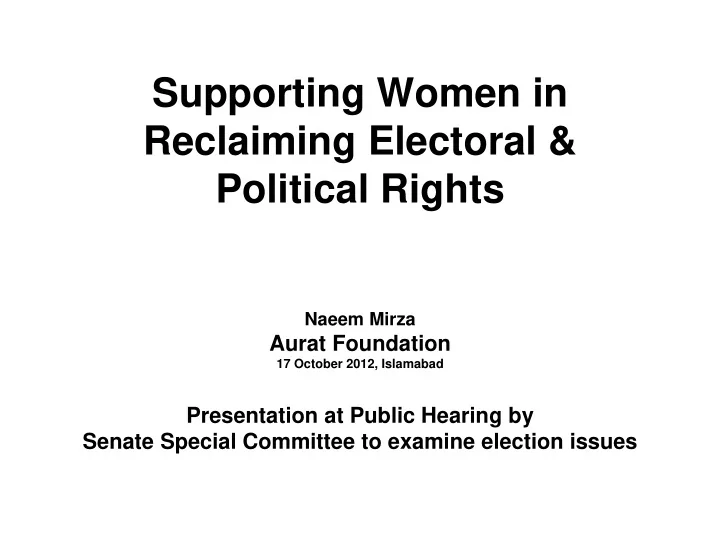

Supporting Women in Reclaiming Electoral & Political Rights Naeem Mirza Aurat Foundation 17 October 2012, Islamabad Presentation at Public Hearing by Senate Special Committee to examine election issues
Aurat Foundation - background • Aurat Publication and Information Service Foundation was established in 1986, by two women’s rights activists, Nigar Ahmad and (late) Shahla Zia • It was born out of women’s movement in Pakistan, with the consciousness that women must remove gender inequality in society and get their due share in economic resources and equal role in decision-making processes • Aurat Foundation currently has presence in all districts of Pakistan through its Citizens’ Action Committees, Information Network Centres and Women’s Leaders Groups
Some Major Election-related Campaigns • Women’s rights issues highlighted during election campaigns in 1993, 1997, 2002, 2008 through manifesto suggestions on women’s rights – several parties incorporated these suggestions • Campaign for 33% reservation of seats in legislatures, local government (1990 onward) – achieved 17% at Senate , national, and provincial level • Citizens’ campaign for women’s representation in local government in 2000-1 & 2005 – thousands of women became local councillors • Campaigns for women’s inclusion in census, ID cards, voter registration • Campaigns against violation of women’s fundamental right to adult franchise and political participation
Registration of Votes & CNICs • During last three year years Aurat Foundation has facilitated 135,036 women to obtain computerized CNICs registration in 30 districts. • Since July 2011, Aurat Foundation, in collaboration with NADRA, is supporting women’s computerized CNICs registration and voter education in 34 districts through social mobilization in collaboration with local organizations. This initiative aims at providing CNICs to about 1.6 million women during the current year
Major issues for women related to legislation and electoral process • Disabling and hostile environment for women in several areas of the country to cast vote and contest polls • Lack of will and absence of legal provision to penalise perpetrators of violating women’s basic electoral rights • Major gender disparity in voters’ lists and CNICs • Absence of representation of women in ECP at the highest decision-making level • Absence of women in Parliamentary Boards of political parties
Major issues for women related to legislation and electoral process • Absence of constituencies for women being elected on reserved seats in national, provincial legislatures • Less number of women are given party tickets on general seats – there is no affirmative action • Unavailability of gender-disaggregated date of votes cast in elections • Financial constraints for women in election campaigns and political violence during electioneering
Major Recommendations • ECP and NADRA ensure gender parity in electoral rolls and CNICs through mass-based campaigns in collaboration with political parties CSOs and media, especially in remote, rural and tribal areas • Political Parties Order 2002 be amended to ensure that elections must be declared null and void in constituencies where less than 10% women’s vote is cast • Governments and ECP must ensure that strict and prompt action is taken against all parties, groups, bodies, candidates and individuals who seek to restrain or disallow women from exercising their right to franchise or contesting elections • ECP should ensure that a system is instituted for collection and compilation of gender disaggregated data with respect to voter turnout in elections
Major Recommendations • Women on reserved seats in National Assembly and Provincial Assemblies should be elected through constituency-based elections • Political parties Order 2002 be amended to make it mandatory for political parties to award at least 10 percent party tickets to women on general seats; parties may create financial pools and provide transport facilities etc to women voters • Relevant laws are amended to ensure women’s effective representation in all key policy and decision-making bodies and forums, including the ECP, economic, planning sector bodies, superior judiciary, advisory task forces • Political Parties Order be amended to make it mandatory for political parties to have a minimum of 33 percent female membership, as well as, a minimum of 33 percent representation of women in all party committees & representation in Parliamentary Boards
Thank you
Recommend
More recommend